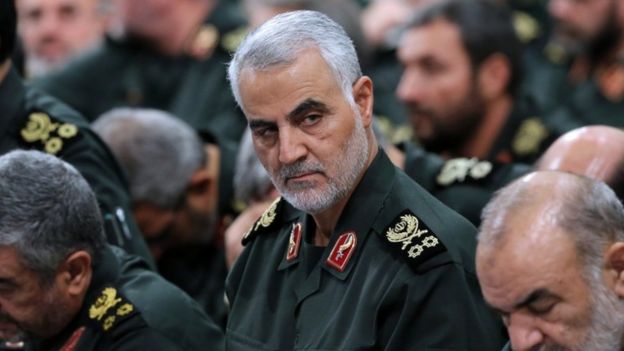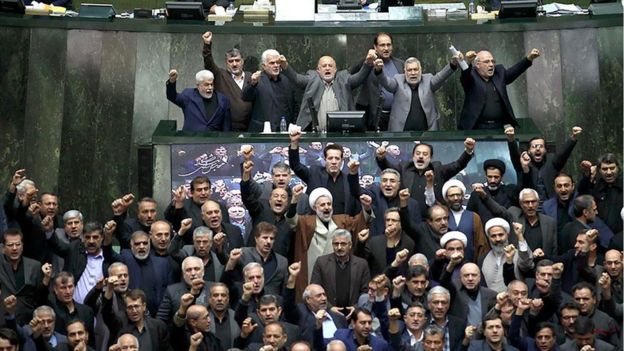

President Trump has threatened severe sanctions against Iraq after its parliament called on US troops to leave the country.
“We have a very extraordinarily expensive air base that’s there. It cost billions of dollars to build. We’re not leaving unless they pay us back for it,” he told reporters.
Tensions are high after the US assassinated Iranian General Qasem Soleimani in Baghdad last week.
Iran has vowed “severe revenge”.
Soleimani, 62, spearheaded Iranian military operations in the Middle East, and was regarded as a terrorist by the US.
The general’s remains have now returned to his home country, where mourners packed the streets of Tehran early on Monday.
The new head of Iran’s Quds force – which Soleimani led – has vowed to expel the US from the Middle East.
“We promise to continue martyr Soleimani’s path with the same force… and the only compensation for us would be to remove America from the region,” state radio quoted Esmail Qaani as saying.

The strike that killed Soleimani also claimed the life of Abu Mahdi al-Muhandis, a top Iraqi military figure who commanded the Iranian-backed Kataib Hezbollah group.
Speaking from the presidential plane, Mr Trump said that if Iraq asked US forces to depart on an unfriendly basis, “we will charge them sanctions like they’ve never seen before, ever. It’ll make Iranian sanctions look somewhat tame.”
Some 5,000 US soldiers are in Iraq as part of the international coalition against the Islamic State (IS) group.
On Sunday, the coalition paused its operations against IS in Iraq, and Iraqi MPs passed a non-binding resolution calling for foreign troops to leave.
The resolution was pushed through by the parliament’s Shia Muslim bloc – which is close to Iran.
Iran has announced it will no longer abide by restrictions imposed by the 2015 nuclear deal, under which it agreed to limit its sensitive nuclear activities and allow in international inspectors in return for the lifting of economic sanctions.
US President Donald Trump abandoned the deal in 2018, saying he wanted to force Iran to negotiate a new deal that would place indefinite curbs on its nuclear programme and also halt its development of ballistic missiles.

Iran refused and had since been gradually rolling back its commitments under the deal.
In a statement, it said it would no longer observe limitations on its capacity for enrichment, the level of enrichment, the stock of enriched material, or research and development.
The leaders of Germany, France and the UK – which were all signatories to the 2015 deal, alongside China and Russia – responded with a joint statement urging Iran to refrain from “further violent actions or support for them”.
“It is crucial now to de-escalate. We call on all the players involved to show utmost restraint and responsibility,” they said.
Mr Trump has vowed to strike back at Iran in the event of retaliation for Soleimani’s death, “perhaps in a disproportionate manner”.
He also repeated a controversial threat to target Iranian cultural sites on Sunday, despite criticism from within the US and overseas.
“They’re allowed to kill our people. They’re allowed to torture and maim our people. They’re allowed to use roadside bombs and blow up our people. And we’re not allowed to touch their cultural site? It doesn’t work that way,” the president said.
In a series of tweets on Saturday, Mr Trump said the US had identified 52 Iranian sites, some “at a very high level & important to Iran & the Iranian culture”, and warned they would be “HIT VERY FAST AND HARD” if Tehran struck at the US. – bbc.com
Sorry. No data so far.

